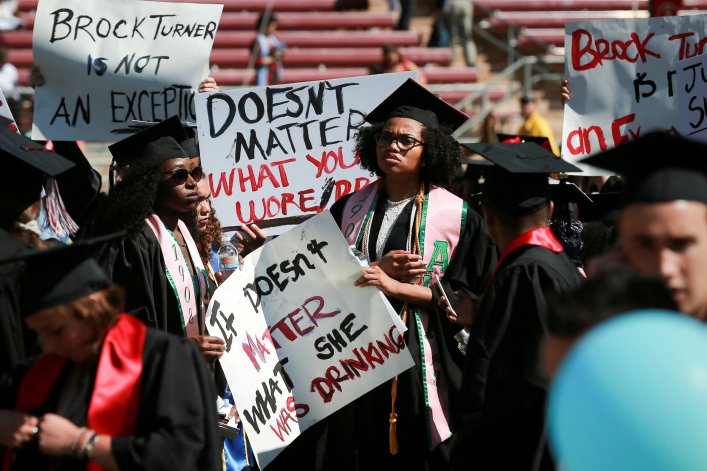Misogyny-ridden rape culture revealed
November 8, 2016
I still remember the first time my dad told me that whenever I go to a party, whether in high school or as an adult, I am never to leave a drink unattended; and if I do, I have to buy a new one. I was only six years old. Ask any girl you know, and she will almost always be able to recite the same “golden rule” of drinking at parties.
As a child, I never understood what the significance of this was: Would the drink spoil in the three minutes it took to go to the bathroom? Would it get too warm to drink? Was it simply common courtesy? It would take me a few years to understand why this rule was so fiercely ingrained into my brain.
We consider our country to be the best of the best, an example for all other countries to follow; but can we really call ourselves a “model country” when people violate a person’s body? According to the Huffington Post, women have roughly a one in five chance and men a one in 10 chance of being raped in the United States. That translates to about 1.3 million women and over 300,000 men raped every year, of all ages.
In addition, only about 46 percent of rapes are actually reported, meaning that over half of the victims of rape continue their daily lives, most likely terrified, while their rapists gets off scotch-free.
Potentially the most abhorrent part of rape culture throughout the United States is the stigma around rape victims, especially women. When a woman speaks up about her rape, it is often followed by “What were you wearing?” and “How much did you drink last night?” Judges often give the rapist the benefit of the doubt when a victim is testifying against him or her, because a female rape victim is automatically discredited due to the fact that she, to a certain extent, allowed the rape to happen. This logic is completely backwards because whether the victim was five beers in at a college party or taking a morning run, the rapist is the person being accused of heinous crime. As far as I am concerned, wearing a low-cut or slinky dress – or no dress at all – to a party is hardly an excuse for rape.
A recent event that has left millions of people abhorred, myself included, is the Brock Turner rape case. Turner was a student athlete at Stanford who, on Jan. 18, 2015 sexually assaulted an intoxicated 22-year-old woman; however, he was convicted of a total of three charges, one of them being sexual assault with the intent of rape. Following an extremely publicized trial – in which he faced up to fourteen years in jail – Turner was sentenced to just six months in prison and three years probation.
A particularly disappointing part of this trial did not even involve Turner himself, it was his father. In order to defend his son after the multiple sexual assault allegations filed against him, Dan Turner wrote a letter which stated, “His life will never be the one that he dreamed about and worked so hard to achieve…That is a steep price to pay for 20 minutes of action out of his 20 plus years of life.” My father read that statement to me, and his expression shifted to one of pure hatred and fear.
To add insult to injury, Turner was released only three months into his sixth month sentence, which I feel is a disgrace to the victim and her family as well as rape victims around the world. For a guilty man – or boy, really – to be given just three months of punishment for, in effect, destroying the life of an innocent woman, is outrageous, and really speaks to the lack of respect and support America shows for rape and sexual assault victims. Sadly, cases such as Turner’s occur often all across the country, especially at college campuses.
In September of 2015, the Yale Daily News wrote an article discussing the prevalence of campus sexual assault, discovering that 28.1 percent of undergraduate women reported a case of “non consensual penetration or sexual touching involving physical force or incapacitation.” Cornell had the lowest percentage out of the seven Ivy League Schools at 22.6 percent. Although the Ivy League is on the
other side of the country, schools such as Chico State University, San Jose State University, UC Los Angeles, UC Santa Barbara, UC Berkeley, and USC have also had multiple sexual assault incidents, most of which receive no attention. According to Campus Safety Magazine, between 20 to 25 percent of women will experience a completed or attempted rape during their college careers while more than 50 percent of women do not tell anyone.
I would attempt to hammer my point in by saying, think of your mothers and aunts and sisters and best friends when you consider the issue. I just hope that one day we will not be confined to teaching society the rules of drinking in order to lessen the chances of rape. Instead, we must understand why rape and any unwanted sexual advances are wrong, and know that “no” will always mean “no,” and silence or the absence of “yes” does not justify committing rape.
